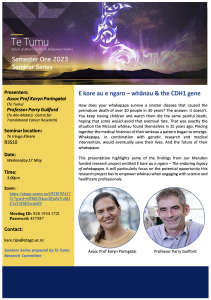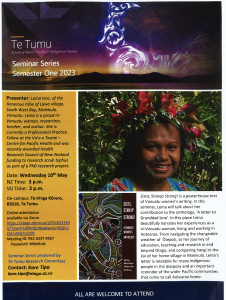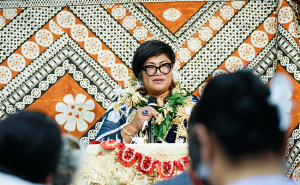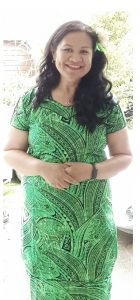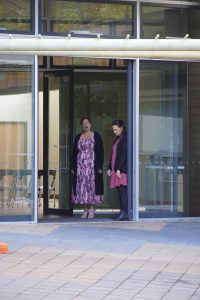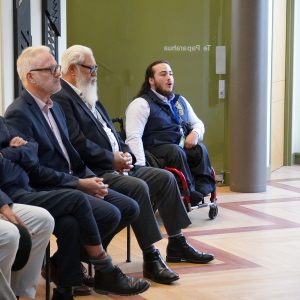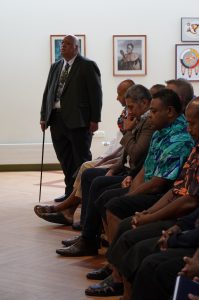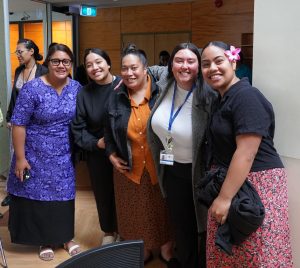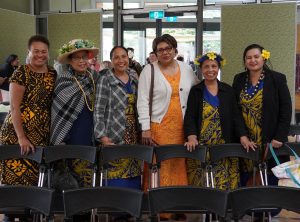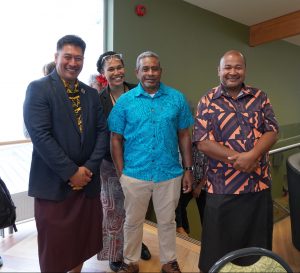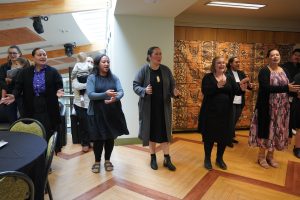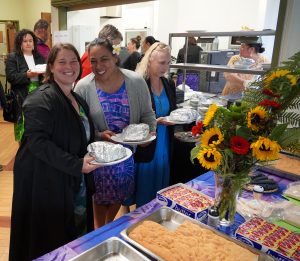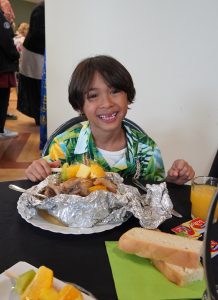Seminar: E kore au e ngaro – whānau & the CDH1 gene
Assoc Professor Karyn Paringatai of Te Tumu has been collaborating with Professor Parry Guilford of Te Aho Matatū – Centre for Relational Cancer Research in a Marsden-funded project on the impact on Māori whānau of the CDH1 gene, a condition with a high risk of stomach cancer.
Come along to the next Te Tumu seminar to hear how Humanities and the Health Sciences have been working together to create positive outcomes for Māori whānau.
When and where? At 3.00pm in Te Iringa Kōrero (third floor of Te Tumu), Wednesday 18 May.
People can also “attend” via Zoom. Click here to enter the Zoom room. Meeting ID: 928 1934 1721 Password: 457587.
Click on the poster for more info. All Interested people are most welcome to attend.
Seminar: Leina Isno – Sista, Stanap Strong!
Leina Isno (ni-Vanuatu) will be presenting the next Te Tumu seminar at 3pm (NZ Time), Wednesday 10 May in Te Iringa Kōrero (3rd floor, Te Tumu). Leina will talk about her contribution to Sista, Stanap Strong!: A Vanuatu Women’s Anthology for which she wrote about her experiences as a ni-Vanuatu woman, living and working in Aotearoa.
Please click on the poster for more information.
This seminar will also be online via Zoom, Click here to join.
Meeting password 932 6337 4957
Password: Malekula.
Seminar contact: Kare Tipa, kare.tipa@otago.ac.nz
All are welcome to attend.
To Hell With Drowning: A Reflection
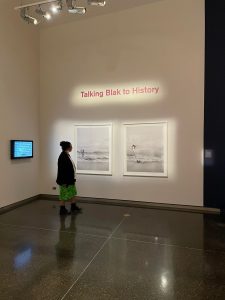
Māori scholar photographs Cook Islands scholar examining Aboriginal artwork confronting White Australian histories at the Australian National Museum, Canberra, April 2023. [click to enlarge]
This is the final reflection from our PhD students who attended the recent Australia Association for Pacific Studies conference in Canberra, by Stacey Kokaua-Balfour.
As someone who has only recently started their PhD, the recent AAPS conference was my first time attending an academic conference. I have come away with not only new questions but the awareness of new geographic and intellectual contexts that might shape those questions. What resonated most with me as someone who has operated in Pacific spaces in Aotearoa for some time, was the way our nation state and its distinct geo-political interests can shape not only how Pacific region and their peoples are framed but also what are considered the most important priorities for academic research.
AAPS was an opportunity to engage with Indigenous thinkers across cultures, nation state borders, languages, breaking across specific colonial interests in the Pacific. The Welcome to Country led by Aunty Serena Williams (Ngunnawal – Wiradjuri) best articulated the idea that as researchers, our best ideas spring from coming together and sharing the distinct and nuanced ways Indigenous peoples engage with land and each other.
Rethinking Australian Coloniality through Pacific Biography
Wanda Ieremia-Allan provides the second of the reflections from our PhD students who attended the recent AAPS conference in Canberra.
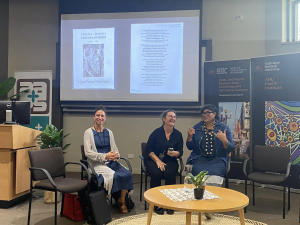
Wanda (right) alongside fellow panel presenters Hineitimoana Greensill and Pauline Reynolds [click to enlarge]
Fleets abound with Pacific scholars, creatives, activists and politicians met at the April 2023 ‘To Hell With Drowning’ Pacific Studies conference at the Australian National University (ANU) in Canberra. As a child of Sapapali’i, Sāoluafata, Safotulafai, Lalomanu, Vaie’e, Matāutu Falealili in Samoa, I extend my Fa’afetai to people of the unceded Ngunnawal and Ngambri lands (Canberra Australia) for their warm welcome and hospitality to country. Thank you also to the Australian Association for Pacific Studies (AAPS) organising committee led by Professor Katerina Teaiwa and Talei Mangioni for their care. Fa’afetai to the AAPS for the Guy Powles travel prize that made it possible for me to attend and I am grateful to my supervisors Dr. Jess Pasisi (Otago), Professor Alice Te Punga Somerville (UBC) and Tootooleaava Dr. Fanaafi Aiono Le-Tagaloa (USP Samoa) for their unwavering support and guidance. Thank you especially to Dr Jess Pasisi for the academic manaakitanga extended to many PhD students.
On a panel with Dr Pauline Reynolds of the Norfolk Island Museum and PhD student Hineitimoana Greensill, I presented my paper on Indigenous Pacific language archives and its role in ‘Rethinking Australian Coloniality through Pacific Biography’. Utilising the intersections between Professor Epeli Hau’ofa’s notion of the ‘totality of relationships’[1] and Māori scholar Professor Alice Te Punga Somerville’s poem ‘Room’[2] provided an opportunity to think about: ancestral links; ideological connections; and spaces of reckoning and recovery.
My paper focussed on Samoan historiography and the kinds of work that are made possible when we centre on Samoan language archives as sites of Indigenous knowledge production and historical recovery. This resulted in the emergence of an intellectual, geographical, linguistic and cultural Pacific expansiveness alongside the rich long standing embodied stories of Pacific connectivity that not only interrogate pervasive Australia white settler colonial histories but demand more institutional university spaces to conduct decolonial work with our languages. Samoan language archives recovered links with fellow kin, in particular South Sea Islanders of Mer Island, Torres Strait Island region where Samoan missionaries and local Mer Island people established the London Missionary Society church named ‘O le Sulu Samoa’ in 1902. Letters from Badu Islands and Vanuatu recovered family histories and brought to light the many ways in which Pacific Islanders see each other and connect over oceans of memory.
Advocating for the use of our own epistemological paradigms in archival engagement is necessary because as matua Tuaopepe Albert Wendt asserts ‘Oceania deserves more than an attempt at mundane fact; only the imagination in free flight can hope, if not to contain her, to grasp some of her shape, plumage and pain’[3]. This is the wero (challenge) set for us all.
[1] Hau’Ofa, E. (1994). Our sea of islands. The Contemporary Pacific, 148-161.
[2] https://nzpoetryshelf.com/2021/05/24/poetry-shelf-noticeboard-alice-te-punga-somervilles-room/
[3] Wendt, Albert, 1982. Towards a New Oceania. In: G. Amirthanayagam. (eds) Writers in East-West Encounter: New Cultural Bearings. London: Palgrave Macmillan, pp 202-215.
Reflections on ‘To Hell With Drowning’ AAPS Conference 2023
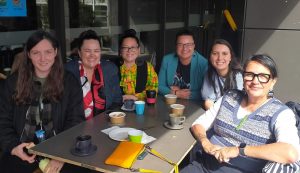
With fellow Māori scholars (L-R): Sam Iti Prendergast, Alice Te Punga Somerville, Marama Salsano, Innez Haua, Karamea, Jo Maarama Kāmira
The following is a reflective piece from Karamea Moana Wright, one of Te Tumu’s PhD candidates in Pacific Islands Studies.
The first Australia Association for Pacific Studies’ conference I participated in was held primarily online in 2021, with separate hubs in Aotearoa and Australia. Because we were in groups on our own campuses, I don’t think I fully understood the magnitude or value of the conference and the association itself until this month, when I attended for the first time in person.
The four days in Canberra at the Australian National University were packed with phenomenal panels, plenaries, roundtables, and whakawhanaungatanga with incredible Pacific thinkers, researchers, artists, leaders, and poets influential in our region and discipline.
This conference opened my eyes in greater measure to salient contemporary conversations taking place in the field, how my own research sits within the broader landscape of Māori, Pacific, and Indigenous Studies, and to see what is possible in my work moving forward. The AAPS conference has left me hopeful, motivated, refreshed, rejuvenated, and encouraged, underscoring the necessity to return for the next AAPS conference in 2023, held in Sydney.
Wonderful achievement for Te Tumu PhD candidate
Te Tumu PhD candidate Wanda Ieremia-Allan is now bound to the UK on a University of Cambridge fellowship to research the historical legacy of the Samoan periodical, O Le Sulu Samoa, a newspaper that has been active for 184 years.Otago’s Bulletin Board wrote a great article on Wanda’s achievement and the background of her interest in this newspaper. Click here to read more.
Te Tumu Seminar: transcending low levels of literacy and numeracy for Pacific people.
Maulupeivao Dr Betty Ofe-Grant is a lecturer from Auckland University of Technology Business School, researching Pacific peoples’ issues in labour migration, careers, glass ceilings, diversity, gender, intersectionality, literacy and numeracy and work. She is also the acting Vice President for the National Council of Women, New Zealand, and a matai (Samoan chief).
Password: 959841
Pacific people in New Zealand are among the most disadvantaged ethnic groups who over-represent the adult working-age population with low literacy and numeracy skills. Individuals with low literacy and numeracy tend to experience higher levels of marginalisation, vulnerability, cycles of poverty and significant risks of poor health and well-being.
Tikaka in action
Tēnā rā koutou, Ni sa bula vinaka, Mālō e lelei, Talofa lava, Kia orana, Fakaalofa lahi atu.
On Friday 24 February Te Tumu welcomed two new staff members, Professor Patrick Vakaoti who is our new Dean and member of the Pacific Islands Studies team, and Dr Wahineata Smith, who is joining our Māori Studies team. A pōwhiri was held at Te Tumu following the tikaka o Kāi Tahu, the mana whenua. We are lucky to have Kare Tipa as one of our staff members who can guide us through the kawa. A big mihi too to everyone involved in the organisation of the event, especially the rika wera from the Office of Māori Development who served the delicious hāngī for lunch. After lunch there was an opportunity for people to informally speak on behalf of the two new staff. Te Tumu staff also presented a koha to Dr Emma Powell, who has just started her maternity leave.
Patrick is a well seasoned sociologist with an interest in Pacific youth, both those who are marginalised and disaffected, but also youth leadership and civic engagement. Currently, he is contemplating research that critically looks at the interface between the University and the aspirations of indigenous students, academics and the community.
Wahineata was once a student at Te Tumu, starting 21 years ago. She completed her PhD at AUT, and is returning to research after being part of the university’s schools liaison team. She is contemplating undertaking research in into families with dual and multiple ethnicities, including aspects of identity and mental wellbeing and the choice of the language[s] in their homes.
We are very lucky to have these two new additions to our staff.
Below are photos, courtesy of Keilah Fox, and Jess Pasisi. Click on images to enlarge.
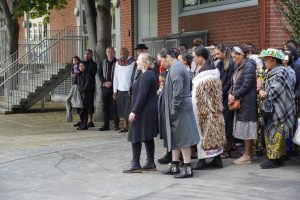
Rauhina Scott-Fyfe responded to the call as kaikaraka for the manuhiri. Wahineata Smith is adorned with the korowai.
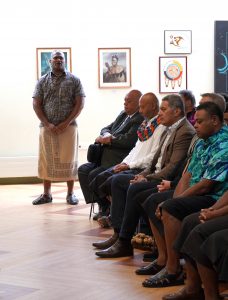
It was great to hear the Fijian language was used within the tikaka of the pōwhiri. Eric Nabalagi spoke on behalf of Patrick.
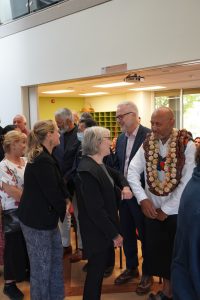
Due to Covid precautions, the elbow bump was utilised in place of the customary hongi. In the foreground, Patrick Vakaoti and Allison Finnegan bump elbows.
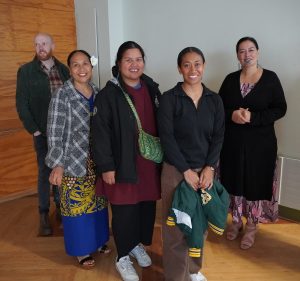
Centre front, Finau Taungapeau (PTO), Tamete Teweti (PIC) and friend. Left flank: Neil Vallelly; right flank, Kare Tipa.
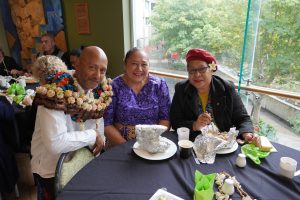
Patrick Vakaoti converses with Telesia Kalavite, the Coordinator of Pacific Islands Studies, and Tofilau Nina Kilifi-Alai, Otago’s Pacific Community Engagement Manager in Auckland.
Success for Te Tumu Postgrad
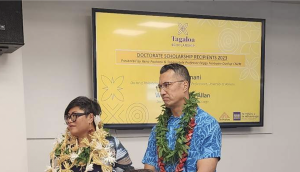 On Wednesday evening, 22nd February, one of our fabulous doctoral candidates, Wanda Ieremia-Allan, was awarded the Tagaloa Scholarship prize. In its second year of running, the Tagaloa Scholarship is awarded to four Pacific masters and doctoral students who are able to “demonstrate that their studies aim improve the social, economic and wellbeing of [the] Pacific, through a Pacific holistic worldview”. Wanda, who recently transferred to Te Tumu from Waikato, is in her final year of doctoral research in Pacific Studies. She is completing cutting-edge research on the impact of Sāmoan missionary newspaper O Le Sulu Samoa and its far-reaching impacts throughout the Pacific. Wanda is being supervised by University of British Columbia Professor Alice Te Punga Somerville, Otago alumni and current Director of USP’s Samoa Campus, To’oto’oleaava Dr. Fanaafi Aiono-Le Tagaloa, and Dr Jess Pasisi here in Te Tumu.
On Wednesday evening, 22nd February, one of our fabulous doctoral candidates, Wanda Ieremia-Allan, was awarded the Tagaloa Scholarship prize. In its second year of running, the Tagaloa Scholarship is awarded to four Pacific masters and doctoral students who are able to “demonstrate that their studies aim improve the social, economic and wellbeing of [the] Pacific, through a Pacific holistic worldview”. Wanda, who recently transferred to Te Tumu from Waikato, is in her final year of doctoral research in Pacific Studies. She is completing cutting-edge research on the impact of Sāmoan missionary newspaper O Le Sulu Samoa and its far-reaching impacts throughout the Pacific. Wanda is being supervised by University of British Columbia Professor Alice Te Punga Somerville, Otago alumni and current Director of USP’s Samoa Campus, To’oto’oleaava Dr. Fanaafi Aiono-Le Tagaloa, and Dr Jess Pasisi here in Te Tumu.
Fast-Start Marsden on Niuean Texts
Fakaalofa lahi atu!
Congratulations to Dr Jess Pasisi on being awarded a FastStart Marsden grant worth $360,000, entitled “Mapping Niue texts in and beyond Aotearoa: Expanding on New Zealand Realm connections to Niue through archival texts.” Jess (Niuean (Mutalau, Hikutavake), Pākehā, Ngāti Pikiao, and Tahitian) is Te Tumu’s most recent academic hire and is based in our Pacific Islands Studies programme, and is already a promising researcher, having been awarded a Pacific Health Postdoctoral Fellowship by the Health Research Council to investigate Niuean happiness.
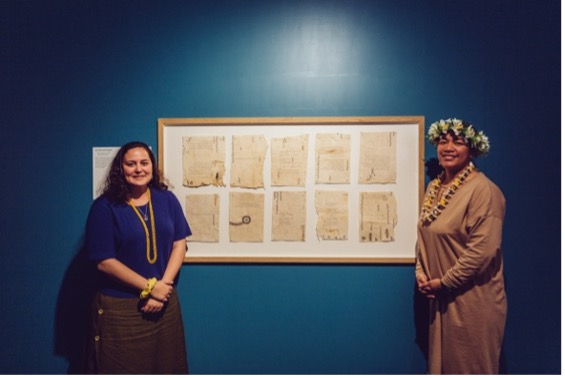
Jess Pasisi (L) and Cora-Allan Lafaiki Twiss at the Auckland Museum exhibition launch of “Archives of Emotion” in 2021, with their piece ‘Ko e Higoa Haaku ko Hiapo’. Photo courtesy of Auckland Museum.
Jess started putting the Mapping Niue texts project together while still based at the University of Waikato, with Professor Alice Te Punga Somerville as Associate Investigator. Professor Somerville has also moved, and is now at the University of British Columbia. She is well versed in literary projects, and Jess worked as a researcher with her in the “Writing the New World” project.
Jess’s Marsden project will be uncovering and analysing Niuean texts – with the meaning of “texts” interpreted quite broadly, comprising publications, manuscripts and other tāoga – with the aim of making these more available to Niuean people in Aotearoa New Zealand, Niue, and beyond. This also involves collaborating with Niuean communities, including cross-disciplinary work with tufuga (experts, practitioners), and encouraging Niuean people to engage with their local archives.
Research outputs include a book based on the project’s research, and the creation of a dataset of Niuean texts which will be invaluable to the wider Niuean community, as well as incoming researchers. Jess is planning three workshops as part of the project, one at Otago, one in Niue, and one at an international venue. Aligning with the aims of Marsden Fund to help develop future scholars, the project will also fund a Masters thesis scholarship, as well as some undergraduate summer scholarships.
We wish Jess well with her exciting new research project, and for a long productive career in academia.
Please also check out the Marsden Fund article for more details on Jess’s research.
Image information. Jess Pasisi wrote the poem for ‘Ko e Higoa Haaku ko Hiapo’ and Cora-Allan Lafaiki Twiss, a tagata Niue artist and practitioner, made it into an art piece that was purchased by the Auckland Museum. To read the poem, see images of the artwork, and more information, click here.

